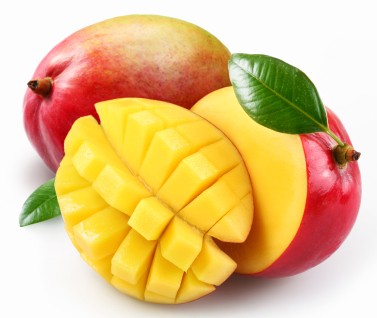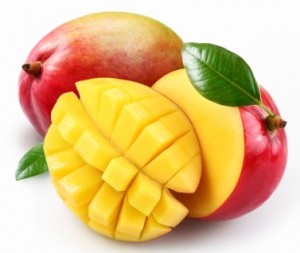
Don’t we just love mangoes? Lush, succulent, and tasty, with different species that come in an array of bright, inviting colours – red, yellow, orange, lime green – this is one delicious fruit that can be enjoyed in a variety of ways. It’s packed full of vitamins too – I bet we know that about all fruits and veggies, but do you really know everything about the mango? Let’s see.
A brief, juicy history
The mango has been the most popular tropical fruit since 2000 BC or earlier. It is a fleshy stone fruit belonging to the genus Mangifera, consisting of numerous tropical fruit trees in the flowering plant family Anacardiaceae. The mango is, actually, native to the Indian subcontinent from where it spread all over the world and is one of the most cultivated fruits in the tropics. While other Mangifera species (e.g. horse mango, M. foetida) are also grown on a more localized basis, Mangifera indica – the common mango or Indian mango – is the only mango tree commonly cultivated in many tropical and subtropical regions. There are over 400 varieties of mango throughout the world.
Right here in Nigeria we have some variants like Kerosene mango (the ellipse-shaped lime-green specie with an aftertaste) and the much loved Sheri mango (the yellow to orange delicious and fleshy kind).
The outer skin of a mango is smooth and green when un-ripe mangoes but turns into golden yellow, bright yellow or orange-red when ripened depending on the cultivar (like the Kerosene mango, which remains green even when ripe).

Why mangoes are good for your health and body
Mango fruit is rich in pre-biotic dietary fiber, vitamins, minerals, and poly-phenolic flavonoid antioxidant compounds. According to new research study, the mango has been found to help protect against colon, breast, leukemia and prostate cancers.
Fresh mango is a very rich source of potassium. Potassium is an important component of cell and body fluids that helps controlling heart rate and blood pressure. It is also a very good source of vitamin-B6 (pyridoxine), vitamin-C and vitamin-E. Consumption of foods rich in vitamin C helps body develop resistance against infectious agents and scavenge harmful oxygen free radicals. Vitamin B-6 or pyridoxine is required for GABA hormone production in the brain. It also controls homocystiene levels in the blood, which may otherwise be harmful to blood vessels resulting in CAD and stroke.
Some specific health benefits of the mango:
1. Lower cancer risk. Mangoes contain a soluble dietary fiber called pectin. The pectin decreases the action of a protein called galectin 9 that is present in cancerous cells and plays an important role in cancer. The possibility of cancer in the gastrointestinal tract can be reduced by the intake of fiber. A compound in mangoes, known as lupeol is said to suppress the tumor cells of prostate cancer.
2. Digestion. Mango contains an enzyme which is said to help in digestion. Esters, terpenes and aldehydes are some of the bio-active ingredients present in the mangoes, which are said to increase appetite and also improve digestion. Eating a mango after a meal helps eliminate problems like indigestion and acidity.
3. Lower cholesterol. Mangoes contain a large amount of pectin, a soluble dietary fibre that efficiently lowers the blood cholesterol levels. Pectin also prevents you from having prostate cancer. The portion originating from pectin combines with galectin 3 (a protein playing significant role in all stages of cancer).
4. Cures anaemia & helps in pregnancy. Mangoes are rich in iron, so they are beneficial for people suffering from anaemia. Regular and adequate intake of mangoes helps to avoid anaemia by increasing the blood count in the body. Mangoes are also very beneficial for pregnant women as a natural source for iron, an extremely essential mineral.
5. Cures acne. Mangoes are related with skin enhancements, and is used as an ingredient in face masks, especially freshly homemade ones. Other than bringing a glow to your face, this fruit also helps to lighten skin colour. Mangoes also treat acne effectively as they open the clogged pores of the skin.
6. Brain Health. Mangoes have abundant quantities of vitamin B6, for maintaining and improving brain functions. These vitamins aid in the amalgamation of the major neurotransmitters that contribute in determining the mood and modification of sleeping patterns. The Glutamine acid content in mango improves concentration and memory power.
7. Body immunity. Mangoes are also rich in abundant quantities of beta-carotene, a carotenoid. This element helps in enhancing the immune system of the body and makes it strong. Vitamin A is an antioxidant and assures you protection against the innumerable free radicals that can harm your internal system.

Enjoy your mango
1. Eat it with your cereal. Mango is added to cereal products such as oat granola.
2. Mango juice. Because the mango is such a dense fruit, it makes rich creamy juices and is perfect for mango nectar smoothies and milkshakes.
3. For baking and Ice cream. Mango is an excellent flavouring ingredient for ice cream and sorbets. Add them also in your recipes for fruit bars, pies, cakes, bread, puddings, and muffins.
4. Mango salad. A few slices of fresh (probably green) mangoes mixed with other fruits and vegetables makes a healthy vegan salad.
5. Mango salsa. This popular recipe is enjoyed all over the world, especially in India and South America. Instead of making your regular salsa, spice it up with mangoes. Here’s a simple recipe on how to make one. Serve with corn chips or grilled chicken or fish.
6. Mix pureed mango with condensed milk and use as a topping for shaved ice.
7. Dessert. For a simple dessert, cut up a mango into slices or cubes. Serve with a glass of fresh strawberry juice or yoghurt.
Did you know?
1. A mango stored at 55 degrees F will last for up to two weeks.
2. 1 cup of mango puree has just 107 calories and provides 25% of the Daily Value for Vitamin A.
Now you know why mangoes are called the king of fruits.
Enjoy your mangoes!


